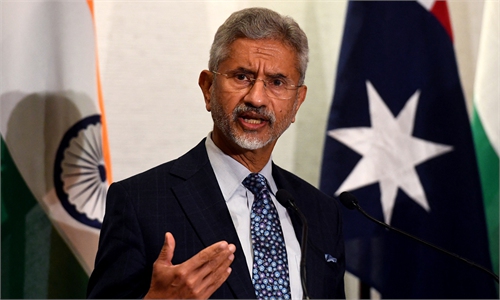
Two women who often post videos on video-sharing app TikTok, shoot a video on a miniature cooking inside their house in Mumbai, India. File Photo: VCG
India reportedly issued a new ban on 54 Chinese apps and directed top app stores to block them in the country, recklessly remaining down the wrong path of escalating economic tensions with China.
Citing a groundless security threat accusation, India's Ministry of Electronics and Information Technology issued the latest ban, local news outlet Economic Times reported on Monday, noting that the government has banned around 224 Chinese apps since June 2020.
It is now not breaking news that the Indian government banned Chinese apps. However, it does need to be pointed out that the move was announced at a time when India's foreign minister just finished his journey to Australia to attend the QUAD meeting. It is no secret that the US-led QUAD has been targeting China in many areas, including network systems. By vilifying the security of Chinese tech and tech firms, the US intends to contain the development of China to maintain its hegemony in the world.
Obviously, New Delhi's latest ban is a complete political move, cracking down on normal business related to China or Chinese firms. However, and much more importantly, besides the loses of the banned firms, it will backfire against India.
Such political move has clearly ignored one crucial factor that India cannot decouple with China in terms of economic development. The record high bilateral trade in 2021 has demonstrated the fact.
In spite of the political tensions and New Delhi's moves to disengage with China, bilateral trade hit a record high of $125.7 billion in 2021, up 44 percent year-on-year. India's imports from China climbed as high as $97.5 billion in 2021, with a trade deficit increasing to $69.4 billion, up 22 percent compared to 2019, according to a report from the Indian Express.
Also, Chinese investments, including apps and smart phones, have facilitated the growth of related Indian industries and its overall economy. Compared with other foreign investors, Chinese entrepreneurs have developed advantages in business localization, management patterns among others, offering better products and services to local consumers.
The broader context is the economic complementarities between China and India which cannot be reversed by political maneuvers. Regardless of the external influence from US-led QUAD or India's internal long-standing protectionism, both cannot change the prospect of long-term economic ties between China and India.
On the contrary, India needs to actively cooperate with China as long as it intends to grow into a leading economic powerhouse. Taking the industrial chain cooperation as an example, the Indian industry will benefit hugely by enhancing cooperation with China because many Indian businesses depend heavily on raw materials from China.
In addition, China, as the largest manufacturing powerhouse in the world, is promoting industrial upgrading and has been relocating some of its lower-end production capacities. Under such circumstances, working with China will facilitate the development of India's lagging industry, especially against the backdrop of the accelerating regional industrial integration in Asia.
As for any specific problems that emerge during cooperation, the two neighboring countries should seek solutions through consultations, including in the so-called "network security issues" that are essentially a guise being used to confront China. Instead, following the US and joining Washington's confrontation against China will only put itself in a predicament.
The author is an editor with the Global Times. bizopinion@globaltimes.com.cn



